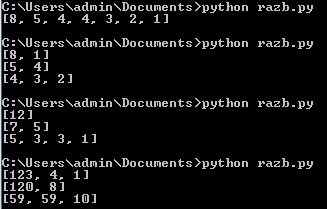Answer the question
In order to leave comments, you need to log in
How to split a set into three subsets with the same sum of elements?
Good afternoon.
I came across a task from the section on dynamic programming, which causes me difficulties. It is necessary to construct an algorithm that, given a set, determines whether it can be divided into three parts, in which the sums of all elements will be equal. For example: [1, 2, 3, 4, 4, 5, 8] -> {1,8}, {4,5}, {2,3,4}
Obviously, if the sum of all elements is not divisible by 3, then the set does not contain such a partition (the simplest part:) ). But how to proceed? It seems like we have to check which subset our a_i element belongs to.
But it is impossible to formalize all this and fasten the dynamics.
I would appreciate it if you could point me in the right direction.
Answer the question
In order to leave comments, you need to log in
The knapsack problem, even two ones :)
Create an array M[0..S/3,0..S/3] (you can use a bit array, but a larger one is better - to store back references). Elements M[a,b] will be marked in it, such that it is possible to select disjoint subsets with sums a and b from the already scanned elements of the current set.
When the next element x arrives, do M[a,b]=M[a,b] | M[ax, b] | M[a,bx] for all a,b starting from the end (from large a,b). If at the same time 0 changed to 1 - mark in the array of back links from which element you got here.
Complexity - O(n*S^2). Can it be done better, I don't know.
Here is a variant of the code - but it only prints two sets. How to print the third, figure it out.
static void Main(string[] args) {
int[] dat=Array.ConvertAll(Console.ReadLine().Split(' '),int.Parse);
int S=0;
foreach(int x in dat) S+=x;
if(S%3!=0) {
Console.WriteLine("-1"); return;
}
S/=3;
int[,] M=new int[S+1,S+1];
M[0,0]=-1;
foreach(int x in dat) {
for(int a=S;a>=0;a--) {
for(int b=S;b>=0;b--) {
if(M[a,b]==0) {
if(a>=x && M[a-x,b]!=0) M[a,b]=x; // back by set1
else if(b>=x && M[a,b-x]!=0) M[a,b]=-x; // back by set2
}
}
}
}
if(M[S,S]==0) {
Console.WriteLine("-1"); return;
}
int u=S,v=S;
string res1="",res2="";
while(u!=0 || v!=0) {
if(M[u,v]>0) {
res1+=" "+M[u,v]; u-=M[u,v];
} else {
res2+=" "+(-M[u,v]); v+=M[u,v];
}
}
Console.WriteLine(res1);
Console.WriteLine(res2);
}Read carefully about splits . Why be smart.
#!/usr/bin/env python
# -*- coding: UTF-8 -*-
#x = [1, 2, 3, 4, 4, 5, 8]
#x = [5, 7, 12, 3, 3, 1, 5]
x = [123, 1, 8, 4, 120, 59, 59, 10]
if (sum(x) % 3 == 0):
tmp = sum(x) / 3
x.sort()
x.reverse()
for i in range(3):
y = []
j = 0
while (sum(y) != tmp):
if ((sum(y) + x[j]) <= tmp):
y.append(x[j])
del(x[j])
else:
j += 1
print(y)
else:
print('Вознеможно разбить на 3 равные части!')
But how to proceed?
$ ./3set
Вводите числа построчно (пустая строка - конец ввода):
1 2 3 4
4 5 8
{ 1, 2, 3, 4, 4, 5, 8 } ->
{ 1, 8 }
{ 4, 5 }
{ 2, 3, 4 }Decided as best I could
function summ(a){
if(a.length==0){return 0}
else{res = 0; for(var i=0;i<a.length;i++){res=res+a[i]} return res;}
}
var ar = [5, 7, 12, 3, 3, 1, 5];
ar=ar.sort(function(a, b){return a-b});
var b=[];
var c =[];
var d=[];
for(var i=ar.length-1;i>-1;i--){
if(summ(b)+ar[i]<=summ(ar)/3) {b.push(ar[i])}
else if(summ(c)+ar[i]<=summ(ar)/3) {c.push(ar[i])}
else if(summ(d)+ar[i]<=summ(ar)/3) {d.push(ar[i])}};
console.log(b);console.log(c);console.log(d)Didn't find what you were looking for?
Ask your questionAsk a Question
731 491 924 answers to any question